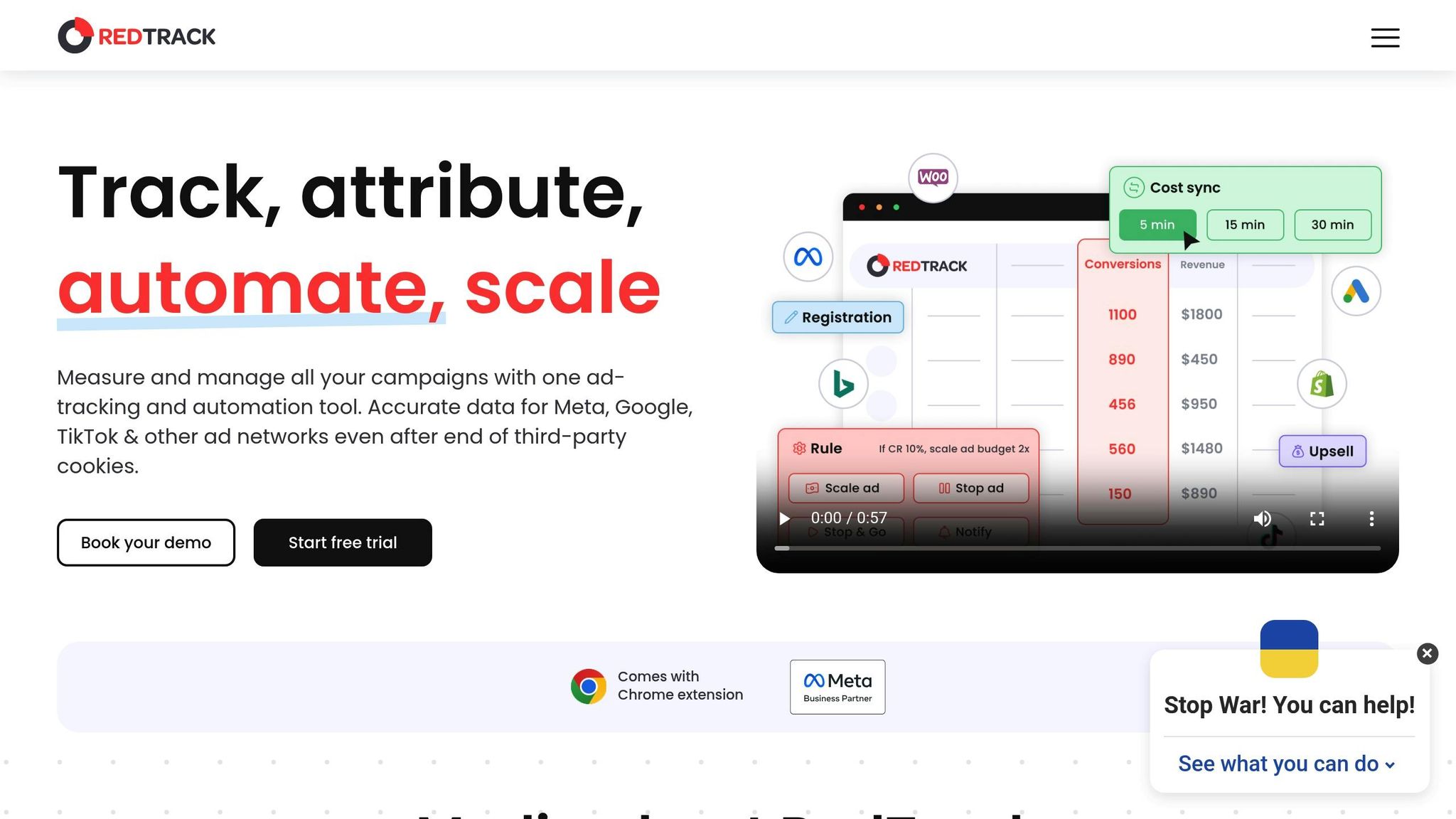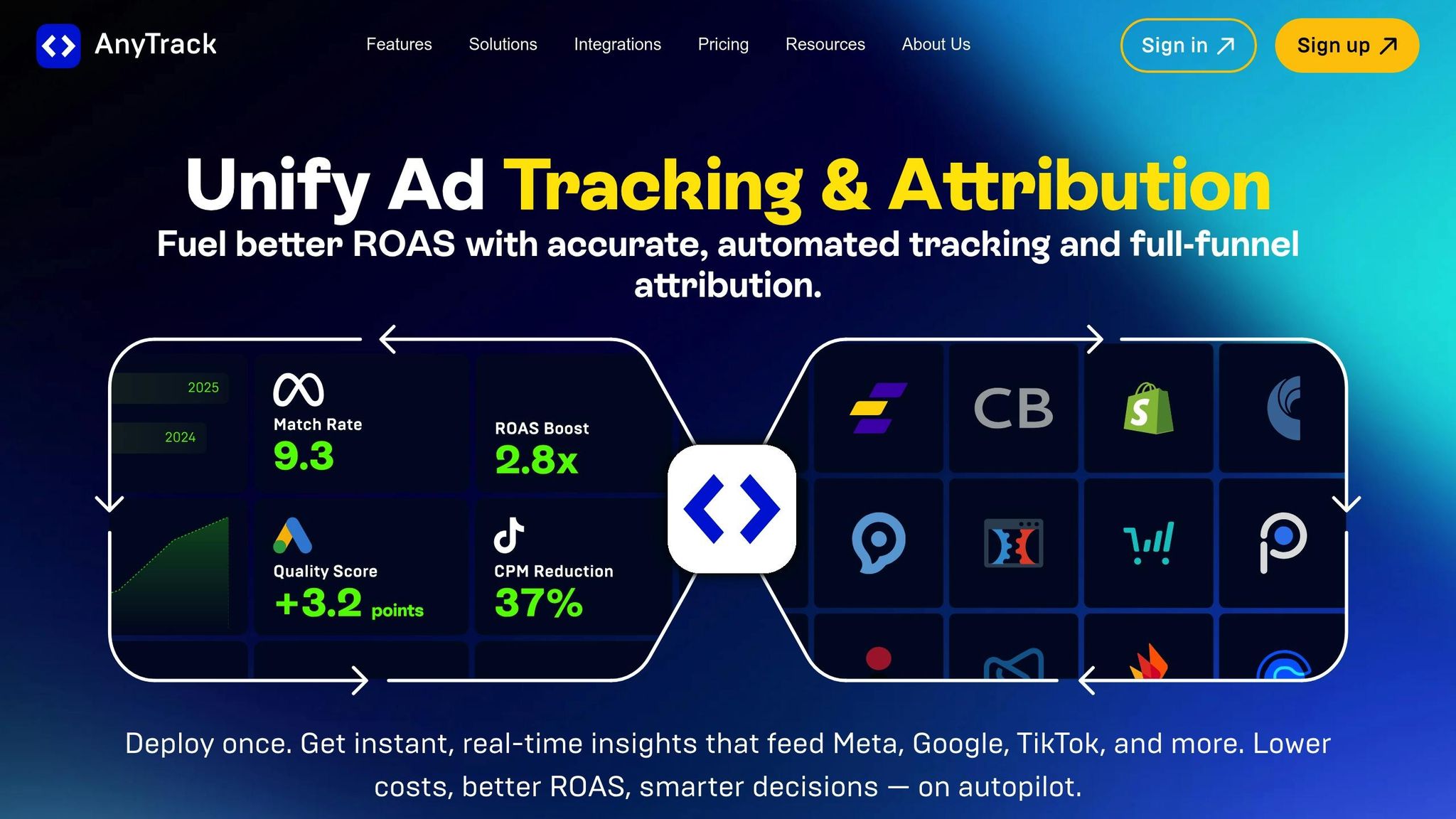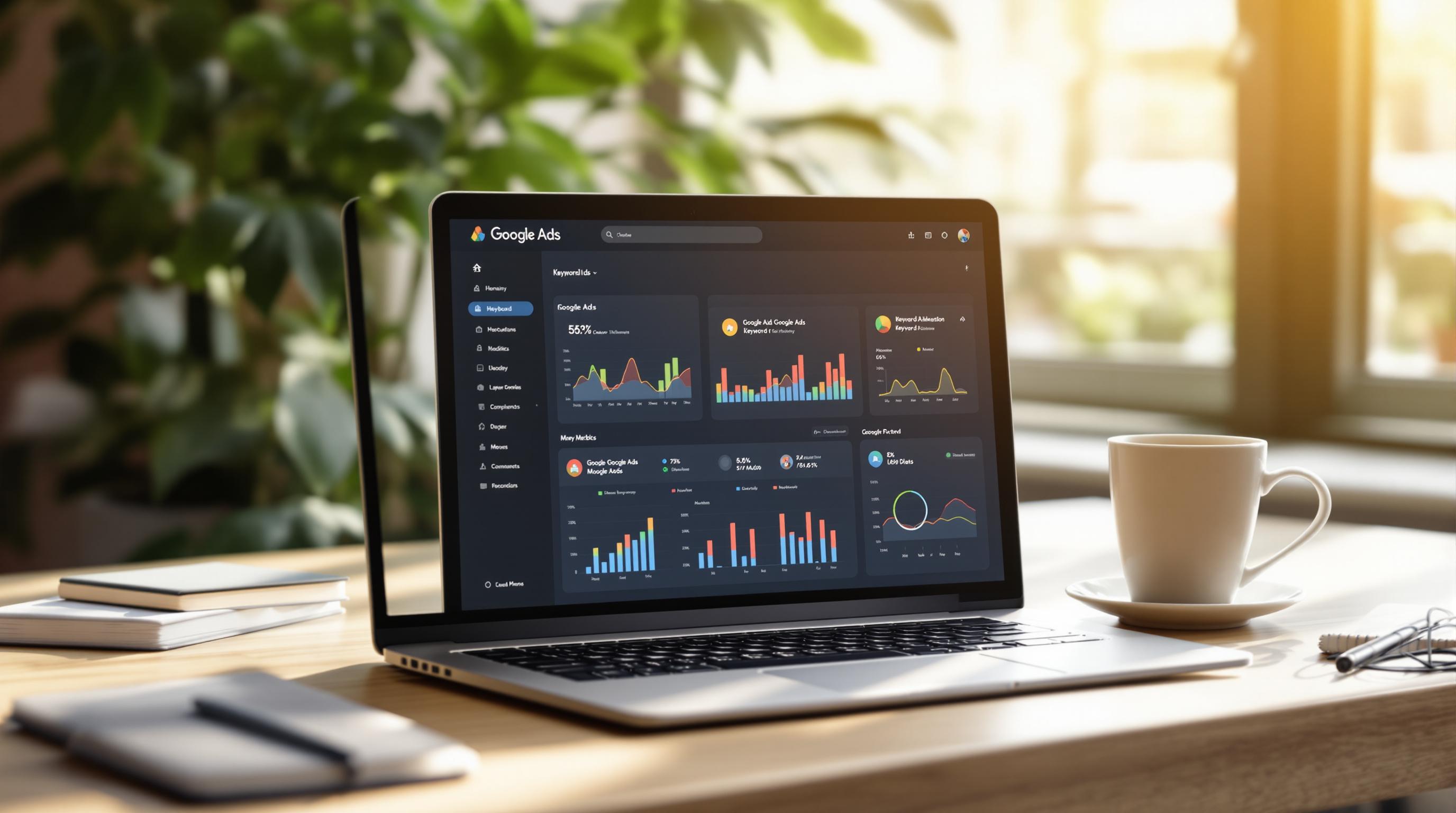Which ROAS tracking tool is better for your business? It depends on your needs.
- RedTrack is ideal for advanced users like agencies, affiliates, and enterprises managing multi-channel campaigns. It offers precise tracking methods (e.g., server-to-server), 200+ integrations, and strong privacy compliance (GDPR/CCPA). Plans start at $99/month.
- AnyTrack is simpler and budget-friendly, great for small to mid-sized businesses with straightforward tracking needs. It emphasizes automation and ease of use, starting at $50/month, but lacks robust integrations and API access.
Quick Comparison
| Feature | RedTrack | AnyTrack |
|---|---|---|
| Starting Price | $99/month (Pro plan) | $50/month (Basic plan) |
| Privacy Compliance | GDPR & CCPA, PII hashing, more | Basic privacy measures |
| Integrations | 200+ | Limited (unlimited on higher plans) |
| API Access | Yes | No |
| Best For | Agencies, affiliates, large-scale campaigns | Small businesses, simple setups |
For U.S. businesses, RedTrack is better for scaling and privacy-heavy industries, while AnyTrack works well for startups or those on a budget.
RedTrack: Features and Capabilities

RedTrack stands out as a powerful tracking platform tailored for marketers who demand precise ROAS measurement, even in complex campaign setups. With its layered tracking strategies and extensive integration options, it’s especially useful for affiliate marketers and agencies juggling diverse client needs.
Tracking Methods
At the core of RedTrack’s tracking system is server-to-server (S2S) technology. This method allows data to flow directly between RedTrack’s servers and advertising platforms, bypassing browser-based obstacles like ad blockers and cookie deletion. By assigning unique IDs to visitors, it ensures accurate tracking across multiple interactions.
To further enhance tracking accuracy, RedTrack integrates Conversion API (CAPI) capabilities. This feature sends rich conversion data directly to major ad networks such as Meta, Google, TikTok, and Bing. According to internal data, combining CAPI with hybrid tracking can increase match rates from 55% to 82%, cut the cost per purchase by 35%, and boost ROAS by 22% - thanks to better Event Match Quality and optimized ad network algorithms.
Affiliate marketers can leverage redirect tracking to manage complex funnels across various offers and traffic sources. Meanwhile, direct-to-consumer brands benefit from no-redirect tracking, seamlessly integrated with platforms like Google Ads and Meta.
RedTrack also employs a Universal Tracking Script to collect first-party cookies while staying compliant with GDPR and other privacy regulations. Its Smart Attribution feature fills in gaps by capturing conversions even when users switch browsers, offering a more comprehensive view of the customer journey.
Platform Integrations
RedTrack’s tracking capabilities are complemented by its connection to over 200 platforms, delivering real-time performance insights. Key ad network integrations include Meta Ads, Google Ads, YouTube Ads, TikTok Ads, Bing Ads, Snapchat, Taboola, Outbrain, Revcontent, Newsbreak, and Applovin.
The platform provides ad-level cost updates every five minutes for networks like Meta, TikTok, Google, YouTube, and Bing, ensuring ROAS calculations are based on near real-time spending. For e-commerce, RedTrack integrates directly with platforms such as Shopify, WooCommerce, Magento, PrestaShop, BigCommerce, Recharge, and CartPanda, syncing revenue data automatically.
For CRM and funnel management, it connects with tools like HubSpot, Salesforce, GoHighLevel, ClickFunnels, and Konnektive. Additionally, API access allows for custom integrations, and a free Chrome extension overlays RedTrack data within advertising platforms, providing instant performance metrics.
Analytics and Automation
RedTrack captures conversion events in real time using postback URLs and webhooks. It also integrates seamlessly with the GTM Data Layer, enabling marketers to use their existing Google Tag Manager setups for streamlined data collection across channels. These automation features work hand-in-hand with RedTrack’s broader tracking ecosystem, simplifying campaign management and analysis.
AnyTrack: Features and Capabilities

AnyTrack is built as a no-code tracking platform, aiming to simplify how businesses measure their return on ad spend (ROAS). Instead of requiring complex configurations, AnyTrack focuses on making tracking straightforward and user-friendly. It automates data collection and attribution, requiring minimal technical know-how.
Tracking Methods
Staying true to its no-code foundation, AnyTrack employs a hybrid tracking system to monitor visitor interactions across websites and landing pages. This approach ensures seamless tracking of customer journeys, even when users navigate between different domains. It also distributes conversion credit across various marketing channels. To address privacy concerns, AnyTrack uses cookieless tracking techniques, aligning with modern data protection regulations.
Platform Integrations
The platform integrates effortlessly with leading advertising networks, e-commerce platforms, affiliate systems, and CRM tools. These integrations automatically sync cost and conversion data, removing the need for manual input and consolidating performance metrics into one place.
Automation and Data Processing
AnyTrack simplifies the setup process by automating the configuration of tracking elements and conversion events. With real-time data processing, marketers get instant ROAS calculations, enabling quick adjustments to campaigns. The platform also includes tools for creating automated audiences based on conversion data, making retargeting and campaign optimization more efficient.
Pricing Plans
A free trial is available for users to test AnyTrack’s features. Its pricing plans are designed to cater to businesses of all sizes, offering options that vary in tracking volume, integration capabilities, and support levels. Payments are made in U.S. dollars, with both monthly and annual billing choices available. These flexible pricing options align with AnyTrack’s emphasis on simplicity, setting the stage for a direct comparison with RedTrack.
RedTrack vs AnyTrack: Feature Comparison
Let's examine how RedTrack and AnyTrack stack up against each other in tracking return on ad spend (ROAS) for U.S. businesses, particularly in a market that prioritizes privacy.
Comparison Chart
The main distinction between these platforms lies in their focus and complexity. RedTrack is designed as a sophisticated ad tracking solution aimed at media buyers, affiliates, e-commerce businesses, SaaS companies, and agencies. On the other hand, AnyTrack functions as a conversion tracking tool that bridges onsite and offline data with platforms like Google Analytics, Facebook Pixel, and various ad networks for multi-channel marketing.
When it comes to privacy compliance, RedTrack stands out with full GDPR and CCPA compliance, offering features like first-party cookies, PII hashing, and IP anonymization. AnyTrack, while offering intelligent data routing, provides less detailed information about its privacy measures.
The two platforms also diverge in tracking capabilities. RedTrack supports a wide array of tracking methods, including direct, redirect, server-side, parallel, web property, funnel, publisher/affiliate, and coupon/promo code tracking. It guarantees 100% conversion and revenue attribution, with smart attribution across browsers, devices, and platforms. This includes support for first-click, last-click, and multi-touch attribution models. In contrast, AnyTrack focuses on syncing onsite and offline conversion data via an attribution engine that routes conversion information.
| Feature | RedTrack | AnyTrack |
|---|---|---|
| Starting Price | $99/month (Pro plan) | $50/month (Basic plan) |
| Privacy Compliance | GDPR & CCPA compliant, first-party cookies, PII hashing, IP anonymization | Intelligent data routing, less detailed privacy specifications |
| Attribution Models | First-click, last-click, multi-touch with 100% attribution | Attribution engine with intelligent routing |
| Integrations | 200+ integrations | 3 integrations (Basic), unlimited (Personal/Advanced) |
| User Limits | 1 user on Pro/Grow; unlimited on Agency | 1 user across all plans |
| API Access | Available | Not offered |
| Billing Model | Event-based, no commission on ad cost updates | Session-based with website limits |
These differences highlight the strengths of each platform, offering a clearer picture for businesses deciding which tool aligns with their needs. The pricing structures show a notable contrast: RedTrack's Pro plan starts at $99/month and includes extensive integrations, while AnyTrack's Basic plan is priced at $50/month but with fewer API and integration options.
For businesses focusing on integration capabilities, RedTrack supports over 200 integrations, making it a more flexible option for companies needing advanced automation or custom system connections. In comparison, AnyTrack lacks API access, potentially limiting its utility for companies aiming to scale or streamline their tracking processes.
RedTrack also offers more advanced features, such as detailed attribution modeling, cross-device tracking without cookies, fraud protection, and robust automation tools. AnyTrack, while simpler, emphasizes ease of use with automated audience creation and real-time data processing, though its feature set is less extensive overall.
Ultimately, the decision comes down to your business's specific needs, technical requirements, and budget. Up next, we'll dive into which platform may be better suited for particular U.S. business scenarios and campaigns.
sbb-itb-89b8f36
When to Choose Each Platform
Deciding between RedTrack and AnyTrack depends on your business model, technical requirements, and future growth plans. Below, we break down scenarios to help you determine which platform aligns best with your needs and budget.
Common Use Cases
RedTrack is a go-to for media buyers, affiliate marketers, and agencies managing large-scale campaigns across multiple sources. It offers detailed control, advanced attribution features, fraud prevention tools, and custom dashboards via API integration. E-commerce businesses with intricate sales funnels also benefit from RedTrack's ability to track users across devices and browsers without relying on cookies.
AnyTrack, on the other hand, works well for small to mid-sized businesses and SaaS companies with straightforward conversion paths. This platform provides a simple, no-code tracking solution, making it ideal for businesses that prioritize ease of use. Its ability to sync both onsite and offline data makes it a practical choice for basic attribution needs. Starting at $50 per month, AnyTrack is an affordable option for startups and growing businesses that don’t require complex integrations or advanced tracking features.
Best Options for U.S. Businesses
When considering the U.S. market, specific factors like privacy laws and operational requirements may influence your decision.
For U.S. companies navigating strict CCPA regulations, RedTrack stands out with its privacy-focused features, including PII hashing and IP anonymization, ensuring compliance while safeguarding customer data.
Enterprise-level organizations in the United States often find RedTrack more suitable due to its extensive integration capabilities. With over 200 integrations available, the platform seamlessly connects with existing tech stacks, minimizing workflow disruptions. Additionally, its event-based billing model is often more cost-effective for high-volume operations compared to AnyTrack’s session-based pricing.
Growing U.S. businesses with plans to scale will appreciate RedTrack’s flexibility. Its robust API access and automation tools allow companies to expand their advertising efforts across multiple channels without needing to switch platforms. RedTrack’s comprehensive tracking methods are better equipped for handling complex attribution as businesses grow.
Startups on a tight budget may lean toward AnyTrack for its lower starting price. However, its limited integrations and lack of API access could pose challenges as these businesses expand.
Highly regulated industries in the U.S., such as healthcare or financial services, often require the advanced privacy compliance features RedTrack provides. Its ability to deliver accurate attribution while protecting sensitive customer data makes it a better fit for industries with stringent regulatory demands.
Final Recommendations
Both platforms offer effective ways to track ROAS, but they cater to different types of businesses.
For companies with intricate marketing needs - like enterprise-level organizations or agencies juggling multi-channel campaigns - RedTrack stands out as a powerful option. Its advanced tracking capabilities and wide range of integrations allow for flexible attribution models, making it a strong choice for businesses handling large-scale operations. However, this level of sophistication typically comes with a higher price tag.
On the other hand, AnyTrack is a budget-friendly solution with a straightforward setup. It’s ideal for businesses with simpler conversion paths. That said, its limited integrations and API support could become a hurdle for companies looking to expand or manage more complex campaigns.
As highlighted in the comparison chart, RedTrack's privacy features are particularly valuable for U.S. businesses needing to meet CCPA requirements, especially in regulated industries.
Ultimately, your choice should align with your business’s size, budget, and growth goals. For personalized PPC tool recommendations and expert services, check out the Top PPC Marketing Directory.
FAQs
What should I consider when choosing between RedTrack and AnyTrack for tracking ROAS?
When choosing between RedTrack and AnyTrack to monitor your return on ad spend (ROAS), it all comes down to what matters most for your advertising strategy.
RedTrack stands out for its strong fraud detection capabilities. Tools like IP blacklisting, proxy detection, and cookie analysis help reduce wasted ad spend. Plus, it offers automation features that streamline campaign management across multiple ad networks. If you're focused on efficiency and protecting your budget from fraudulent activity, RedTrack could be the better fit.
Meanwhile, AnyTrack shines with its focus on real-time insights and smooth integration across a variety of marketing channels. Its ability to provide instant data updates and its user-friendly design make it a great option for marketers who need quick, actionable insights and straightforward tracking.
Your decision ultimately hinges on your priorities: whether you need advanced fraud prevention and automation or prefer real-time data updates and seamless integration for your campaigns.
How does RedTrack protect user privacy and ensure compliance with regulations like GDPR and CCPA?
RedTrack places a strong emphasis on protecting user privacy by implementing features like IP anonymization and cookieless tracking. These tools not only align with privacy regulations such as GDPR and CCPA but also ensure that personal click data remains untouched.
To add another layer of security, RedTrack employs IP masking, which helps shield user information. This makes it an ideal option for marketers who want to monitor campaign performance efficiently while respecting user privacy and staying within legal boundaries.
Is AnyTrack suitable for managing complex marketing campaigns, or is it better for simpler setups?
AnyTrack streamlines campaign management with its simple, no-code setup, making it perfect for users who lack technical skills. But don’t let the simplicity fool you - this tool is built to handle advanced marketing campaigns by automating tasks and delivering clear, actionable insights. Whether you're running basic ads or tackling more detailed strategies, AnyTrack adapts to meet your needs.


